 Petzlover
Petzlover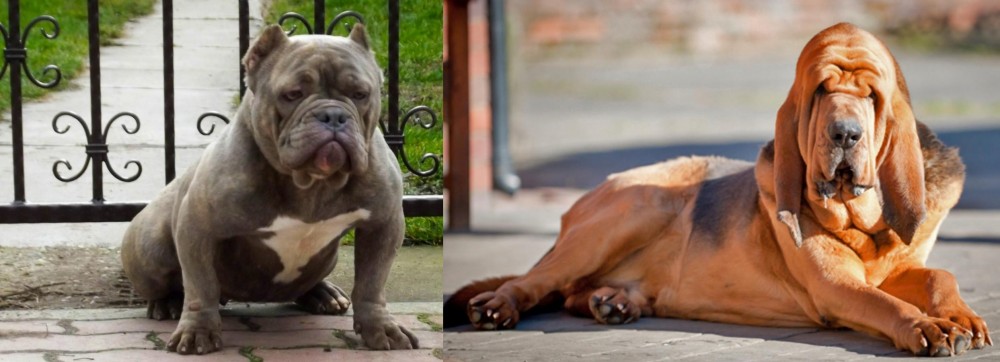 American Bully is originated from United States but Bloodhound is originated from United Kingdom. Both American Bully and Bloodhound are having almost same height. American Bully may weigh 22 kg / 48 pounds lesser than Bloodhound. American Bully may live 4 years more than Bloodhound. American Bully may have less litter size than Bloodhound. Both American Bully and Bloodhound requires Low Maintenance.
American Bully is originated from United States but Bloodhound is originated from United Kingdom. Both American Bully and Bloodhound are having almost same height. American Bully may weigh 22 kg / 48 pounds lesser than Bloodhound. American Bully may live 4 years more than Bloodhound. American Bully may have less litter size than Bloodhound. Both American Bully and Bloodhound requires Low Maintenance.
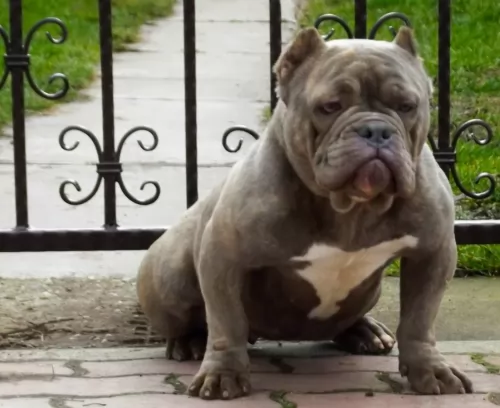 The American Bully breed was founded in the United States in the mid of 1990s also recognized by the United Kennel Club on July 15, 2013. They are augmentation from the American Pit Bull Terrier breed. The ultimate goal of creating this breed was the best family companion. They are selective breeding which means the characteristics and their temperament are artificial ones. So they are influenced by several other breeds like English Bulldog and Olde English Bulldog. Even though they are selective breeding, they possess the peculiar temperament is ultimate companion to their owners.
The American Bully breed was founded in the United States in the mid of 1990s also recognized by the United Kennel Club on July 15, 2013. They are augmentation from the American Pit Bull Terrier breed. The ultimate goal of creating this breed was the best family companion. They are selective breeding which means the characteristics and their temperament are artificial ones. So they are influenced by several other breeds like English Bulldog and Olde English Bulldog. Even though they are selective breeding, they possess the peculiar temperament is ultimate companion to their owners.
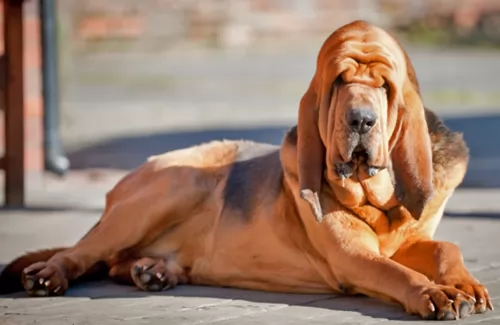 The history of the Bloodhound breed is a fascinating one. Known as a Sleuthhound for its ability to smell out the culprit and bag the prey. Even more so the Bloodhound is known for tracking and finding lost people. He is famous for finding human scents and being able to follow them even days or weeks after the person is lost. They are also able to track people over a great amount of land and have been known to successfully track escaped prisoners or wanted criminals. They are descended from the Saint-Hubert Hounds that were bred at the Abbey/Monastery at Saint-Hubert, Belgium. According to the legends the St. Hubert hounds were bred by the Monks in 1000AD. This hound was thought to be a mixed breed rather than a purebred. That’s because the ancestry of this hound is not really known but it is known that the monks bred them and sent several to the King of France annually. Only black hounds were gifted.
The history of the Bloodhound breed is a fascinating one. Known as a Sleuthhound for its ability to smell out the culprit and bag the prey. Even more so the Bloodhound is known for tracking and finding lost people. He is famous for finding human scents and being able to follow them even days or weeks after the person is lost. They are also able to track people over a great amount of land and have been known to successfully track escaped prisoners or wanted criminals. They are descended from the Saint-Hubert Hounds that were bred at the Abbey/Monastery at Saint-Hubert, Belgium. According to the legends the St. Hubert hounds were bred by the Monks in 1000AD. This hound was thought to be a mixed breed rather than a purebred. That’s because the ancestry of this hound is not really known but it is known that the monks bred them and sent several to the King of France annually. Only black hounds were gifted.
Some kings preferred not to hunt with these hounds thinking them not good enough while others thought the only use for them was as a leash hound. All described the St. Hubert as long in body with short legs. These gifts continued until the French Revolution when hunting in France was greatly reduced until the 19th century. The original St. Hubert strain became extinct in the 19th century and that the current European St. Hubert hound has its origins in the Bloodhound. The Bloodhound as a separate breed was already established in Europe by the middle of the 14th century. They were used as leach hounds to sniff out the prey so that the pack hounds could chase and keep it “at bay”. They were also used from the beginnings of the breed to track humans. At this time they were often known as sleuth hounds. As recorded by John Caius – the authority on Bloodhounds from their origins – writes about the breeds ability to find and track the scent of blood – thus becoming the Bloodhound and its use to track poachers and thieves. He also reported that the Bloodhound and the Sleuth Hound were the same basic breed. The number of Bloodhounds in Britain gradually declined until few remained after World War II. Britain has gradually built their breed back up by importing dogs from America. It was during the 19th century that the Bloodhound was imported into France by breeders who wished to reestablish the St. Hubert Hound. Thus the St. Hubert is both the ancestor and descendent of the Bloodhound. The Britain’s continue to believe that the Bloodhound is a native British breed.
The Bloodhounds in America have had great success as companion animals, with police departments and forest rangers and showing in the prestigious Westminster Kennel Club in New York. There are more Bloodhounds in the United States than anywhere else in the world.
In the end the Anglo-Saxton Bloodhound cannot be specified with any real certainty. Many believe it was not the St. Hubert that the Bloodhound descended from but rather the Norman hound or the sleuth-hound. Many believe it could have included other breeds such as the southern hound, the dun-hound and the Talbot. It cannot be proven today it the Bloodhound’s origins come from Belgian or England.
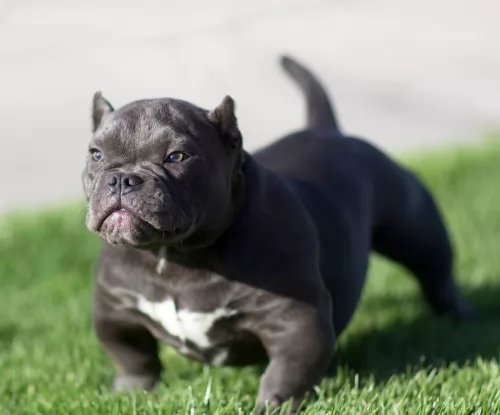 They have proper muscle tone. They are a good family dog. They are very active and agile because of their head and body proportion are balanced. Even though they are a smooth coat dog, they have a great strength because of their size. The super power of this dog possess tremendous stamina and power. An ultimate are essential for maintain the proper muscle tone and also avoid the gain of overweight. The American Bully dog possesses the intense energy to do well in performance and showcase their talents in the events.
They have proper muscle tone. They are a good family dog. They are very active and agile because of their head and body proportion are balanced. Even though they are a smooth coat dog, they have a great strength because of their size. The super power of this dog possess tremendous stamina and power. An ultimate are essential for maintain the proper muscle tone and also avoid the gain of overweight. The American Bully dog possesses the intense energy to do well in performance and showcase their talents in the events.
There are four kinds of American Bully. Each and every breed has minor difference in their appearance also characteristics. They are,
They have medium and large size compact body than the other varieties. The impression of this dog gives little bit rough and tough. But their behaviour is so gentle and also easily mingle with the people and fellow dogs.
The Classic kind is the inspired American Bully. They are light weight than the other varieties. So they have lighter body and less body mass. They have bones substance only not in buff.
The pocket bully possess the same characteristics and appearance of Standard bully. But the only one difference between both of us is height. The pocket bully is shorter than Standard. Even though it is a pocket bully it does not fit in anyone’s pocket, just for kidding.
Extra Large bully have heavily muscled. So they are very impressive according to the appearance wise. This is also similar to the Bully Standard, they are same in characteristics, temperament and appearance. They are easily weight gaining.
UKC- United Kennel Club
APBT- American Pit Bull Terrier
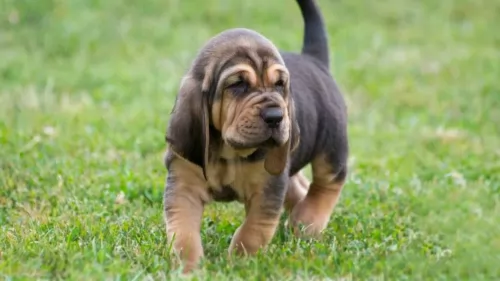 When being judged for confirmation in a show ring, the preference is for a larger dog, with an unusual skeleton in respect to its large size and heavy weight in the bones. They have a narrow head, flat at the sides, but long. They have deep set eyes buried in the deep, long face and wrinkles. The eyes might be yellow or run the gamut to deep hazel depending upon the color of the dog. The long velvety ears and thin and low set on the head. These long ears are as much a part of the Bloodhounds Olfactory system as his amazing nose. They curl backward and inward as the ends. There is a large amount of loose skin on the head and at the jowls. When the Bloodhound lowers his head the loose folds and ridges of skin are prominent on the face and forehead.
When being judged for confirmation in a show ring, the preference is for a larger dog, with an unusual skeleton in respect to its large size and heavy weight in the bones. They have a narrow head, flat at the sides, but long. They have deep set eyes buried in the deep, long face and wrinkles. The eyes might be yellow or run the gamut to deep hazel depending upon the color of the dog. The long velvety ears and thin and low set on the head. These long ears are as much a part of the Bloodhounds Olfactory system as his amazing nose. They curl backward and inward as the ends. There is a large amount of loose skin on the head and at the jowls. When the Bloodhound lowers his head the loose folds and ridges of skin are prominent on the face and forehead.
For many centuries all different colors of Bloodhounds could be found. Today however they are pretty much red, black and tan and black and liver. The Bloodhound is a powerful dog and is larger than most breeds of hounds.
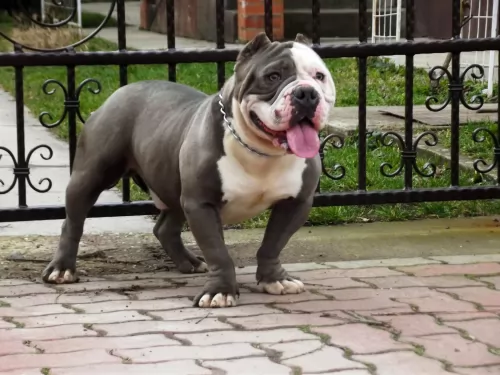 The American Bully is ultimate family companion. They are very loving and gentle with the people and their fellow dogs. They are extremely affectionate with family members.
The American Bully is ultimate family companion. They are very loving and gentle with the people and their fellow dogs. They are extremely affectionate with family members.
This breed is the best companion also obedient to their owners. It is very intelligent because they have a decision caliber. If anyone make harm to their master, it will aggressive and ready to bite those people. This breed possesses the loyalty and amiable.
They are love to play with kids. This breeder have unique character like extreme tolerance with children. Even though it may be calm in nature, you have to frequently monitor while playing kids with dogs.
The breed is versatile and capable of accomplishing a wide variety of tasks. Like Frisbee, swimming, hide and seek and throw ball. If athlete train the dog they are perform and showcase their talents in the events. Even though they are outgoing dogs, they strictly follow their rules instruct by the master. They are obedient and trustworthy.
American Bully will do okay in an apartment living. Even though they live in moderate weather, they prefer warm climates only. They are love to live with people or even fellow dogs.
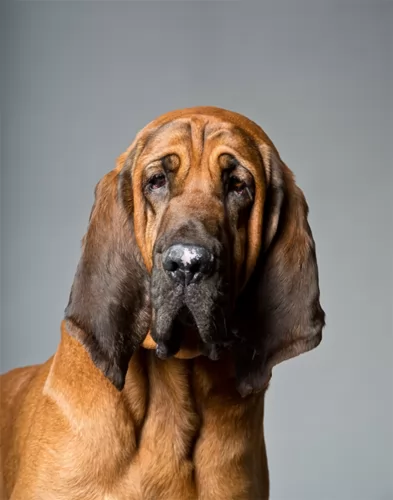 The Bloodhound is known as a gentle soul and he truly is. They are affectionate and gentle with people and children. However, their strong will to track can make them stubborn and hard to handle and train. They are easy going dogs and really like to be with people, children and other dogs. They are affectionate but tend to be set in their ways.
The Bloodhound is known as a gentle soul and he truly is. They are affectionate and gentle with people and children. However, their strong will to track can make them stubborn and hard to handle and train. They are easy going dogs and really like to be with people, children and other dogs. They are affectionate but tend to be set in their ways.
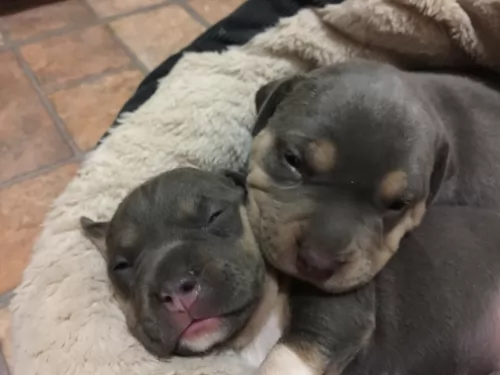 Some bully breeders give drugs to their dogs. For the purpose a large muscular body and glossy hair. When the drugs are stopped the dog’s body shrinks back down to a normal size and the hair fall may happen. But it will made many health issues to their dogs, especially it will create organ and joint problems. So better to avoid the usage of drugs.
Some bully breeders give drugs to their dogs. For the purpose a large muscular body and glossy hair. When the drugs are stopped the dog’s body shrinks back down to a normal size and the hair fall may happen. But it will made many health issues to their dogs, especially it will create organ and joint problems. So better to avoid the usage of drugs.
Sometimes drug’s impact can passed from mother to puppy. If you are adopt a puppy in the market be sure you can find a drug free dog. It will be avoid heritage issues also.
If the Bully have Cherry colour eye, are often affecting by the ectropion and entropion disease. It causes the eyelid is turned outwards away from the eyeball.
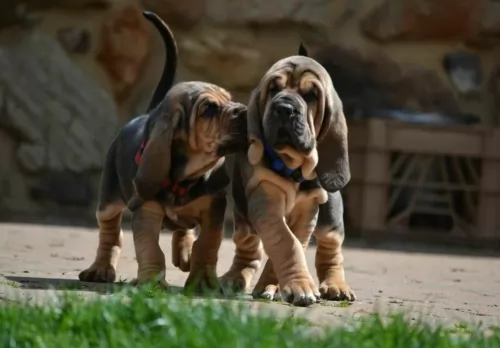 Obviously with ears like the Bloodhound there is always a chance for problems and serious infections. The ears need to be cleaned daily. Because their coat is so thick, they can overheat easily, and they are very prone to bloat, as are many large animals. However, with the Bloodhound, Bloat is the number one killer. Their lifespan is one of the shortest of all dogs at 6.75 years.
Obviously with ears like the Bloodhound there is always a chance for problems and serious infections. The ears need to be cleaned daily. Because their coat is so thick, they can overheat easily, and they are very prone to bloat, as are many large animals. However, with the Bloodhound, Bloat is the number one killer. Their lifespan is one of the shortest of all dogs at 6.75 years.
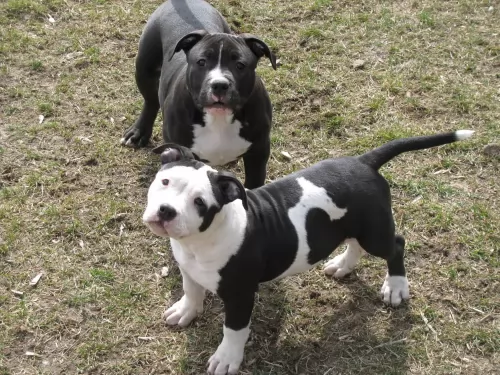 This breed is naturally have glossy hair. So we can easily groom it. If we are using the dry shampoo and brush the hair as necessary for improve the hair’s health. After bathe rub with a piece of towel because this breed is average shedder.
This breed is naturally have glossy hair. So we can easily groom it. If we are using the dry shampoo and brush the hair as necessary for improve the hair’s health. After bathe rub with a piece of towel because this breed is average shedder.
Vaccination should be the top priority for pets. It will prevent the dogs from rabies. Keep the health check-ups frequently at least once a year.
The worms can easily affect our breed. But we are not easily found unless bully avoid having the food and also checking bully’s waste matter. De-Worming can be prevent by checked every three months to the veterinarian.
Vitamin supplements can help your bully’s nutritional health. There are a lot of vitamin supplements are available in market, but we recommended choosing the best American Bully supplements. The best food for bully needs quality meats that contains high protein rich and fat.
Keep doing exercise is improve the bully’s physique. They are very interested to chase Frisbee. But swimming and walking will be good for them. They are keen bond with master and their family members also like to play with fellow dogs.
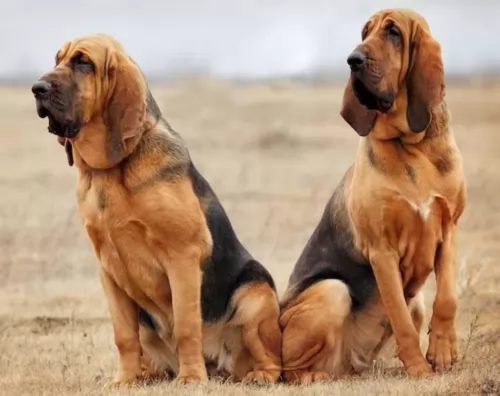 The Bloodhound is not a high energy, fast moving dog but that does not mean he doesn’t have serious nutritional needs. An overweight Bloodhound is on a course to an early demise. They should be fed a high-quality food once a day or split into two daily servings. Do not feed them right before or right after strenuous exercise and remember that strenuous exercise for a Bloodhound is considerably less than it is for a terrier.
The Bloodhound is not a high energy, fast moving dog but that does not mean he doesn’t have serious nutritional needs. An overweight Bloodhound is on a course to an early demise. They should be fed a high-quality food once a day or split into two daily servings. Do not feed them right before or right after strenuous exercise and remember that strenuous exercise for a Bloodhound is considerably less than it is for a terrier.
As previously mentioned the number one cause of death in Bloodhounds is Bloat. They are also prone to cancer. They have minor issues with their eyes, but their ears and skin are also major concerns. Clean the ears daily and wipe out the skin folds and wrinkles to prevent infections. They should be test for hip and elbow dysplasia simply because they are large dogs, though these conditions are less common in Bloodhounds.
Though the Bloodhound is known as a couch potato his stamina and activity levels are usually greatly underestimated. He can follow a scent for 7-10 hours over miles of terrain with out a problem. He needs daily exercise such as long walks on a leash. Do not take your Bloodhound out off leash because if he picks up a scent and wanders off you will not be able to get his attention to call him back.